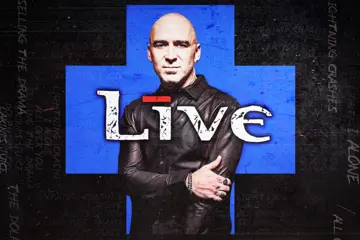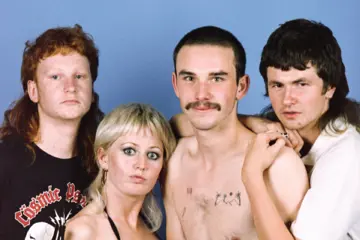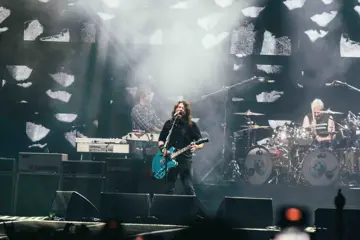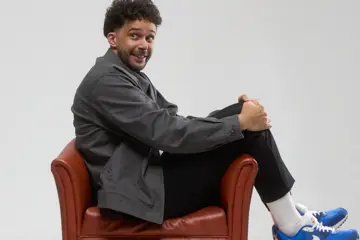 Tkay Maidza
Tkay MaidzaThere seems to be a stigma surrounding the vibrancy of Adelaide's creative energy — an underestimation the state has been using to its advantage in recent years.
While the rest of the country frantically scrambles to keep up with trends, the City Of Churches is making its own.
It's easy for some to dismiss South Australia as nothing more than those religious structures it's known for, but looking a little deeper (actually, inside one of those churches), an entirely different story begins to unfold.
Seemingly ordinary from the street, St Paul's Creative Centre is an eclectic creative hub that houses Music SA, the Music Development Office, venue The Jade Monkey and a handful of other endeavours all helping to drive a movement of global proportion.
“I’d ask him if he could feel the shift… he’s quite silent about Adelaide now,” says UNESCO Adelaide director Sarah Bleby of SA native Paul Kelly's Adelaide, in which he sings, “All the king's horses, all the king's men, wouldn't drag me back again to Adelaide.”
“I don’t think we saw ourselves as a bold city, but we are starting to now."
Don't miss a beat with our FREE daily newsletter
“He doesn’t really reference his roots here,” Bleby adds. “I’d ask him about what he experienced as a musician starting out and what he thinks is important for musicians here now."
A completely different looking state when he penned the lyrics back in 1985, it was probably a fair call. It wasn’t that there was a lack of talent in Adelaide (see Cold Chisel, Redgum, The Angels), rather the right creative industry support systems weren’t in place. In the past, artists and industry folk would jump ship to Melbourne or Sydney in an effort to thrive, to escape the stigma associated with the state.
“I don’t think we saw ourselves as a bold city, but we are starting to now,” Bleby tells. “There was a cultural cringe going on; it’s like we’ve grown up a bit and got a sense of ourselves and don’t feel the need to be comparing ourselves to the big cities anymore.”
One of the main driving forces behind the scenes helping give a huge spectrum of up-and-coming acts a platform to be heard is Music SA, with general manager Lisa Bishop in the thick of preparing for the inaugural July Umbrella Winter City Sounds festival.
There are two coffees perched on her desk next to a stack of programs for the festival, but Bishop insists only one is hers. You couldn’t blame Bishop for needing a double dose before 10am, though, especially after you take a quick glance at the program.
The new festival aims to shine a spotlight on local talent in the gap between big-name festivals, and to describe the resulting bill as innovative and eclectic might be an understatement, with Music SA commissioning a series of curated projects from local entrepreneurs. “We just gave them a small amount of money each to go away and think creatively about how you showcase live music in Adelaide in winter,” Bishop explains. “They’ve come up with stuff like Scandinavian metal in an old criminally insane ward at a mental hospital, or pop-punk on top of a car park or new folk music in the Adelaide Zoo, so there’s a lot of stuff happening,” she tells.
“Most importantly, it’s about local talent and local venues… over 200 shows, 60 venues, I’m kind of a bit blown away about how much people have embraced it.”
There are constantly artists breaking out from the pack, most recently Adelaide singer Tkay Maidza scoring a UK BET nomination — an artist featured across the Music SA promo at St Paul's. It's another example of industry and creative endeavours seamlessly supporting one another through a sense of community that's unique to the state.
One of the venues taking part in Umbrella is the Exeter Hotel, booked by 5/4 Entertainment who also manages Maidza — again, everything seems to be connected.
Both 5/4 Entertainment and Maidza have received funding and mentorship as part of the Arts SA Robert Stigwood Fellowship, now in its third year. Stigwood was born in Adelaide and managed the Bee Gees and Cream, produced Grease, Saturday Night Fever, Hair and more, and although he passed away earlier this year at 81, his legacy lives on strong.
 “Initially when [Tkay] got the funding, that just allowed us to make things happen — like we needed to go to CMJ, so we went to CMJ and now we have an American record deal," says 5/4’s Craig Lock on the balcony of the Exeter, next to collaborator Dan Crannitch, and Stu MacQueen of Wonderlick Management (Josh Pyke, Grinspoon, Boy & Bear).
“Initially when [Tkay] got the funding, that just allowed us to make things happen — like we needed to go to CMJ, so we went to CMJ and now we have an American record deal," says 5/4’s Craig Lock on the balcony of the Exeter, next to collaborator Dan Crannitch, and Stu MacQueen of Wonderlick Management (Josh Pyke, Grinspoon, Boy & Bear).
"These things probably wouldn’t have happened if we didn’t have that extra little bit of money and also getting advice from a more experienced manager like Stu.”
It’s the diverse skills and practical knowledge of Crannitch and MacQueen that sees the fellowship providing more for its artists than most others can offer, with Crannitch describing it as “almost like a surrogate A&R management” funding system. “Originally it started because of a little bit of a lack of industry in South Australia, a lack of management and labels that would generally offer a bit of infrastructure around an act and help it,” he tells.
“Adelaide was one of those places — it’s definitely changed now — but traditionally, it has been a bit of a place that, when you were based here, and came back, there was a bit of a vacuum and all of sudden you were out of where the action is happening and it was easy to lose momentum, so a lot of it is about keeping the artist plugged in.”
Unlike other grants that rely heavily on paperwork, the talent selected for the program are chosen on the merit of the music, and then nurtured for a 12-month period that sees international exposure like a slot on the Aussie BBQ at UK festival The Great Escape.
"The reason festivals survive is they have to have a connection with the city."
“On a regular basis we sit down with each artist and look at their career, where they are creatively, what they need to be doing to move forward,” MacQueen says, juggling mentoring sessions and splitting him time between Adelaide and Sydney. “Then we try to help facilitate that as much as we can with advice and funding fairly tailored.”
Maidza’s BET nomination is just one aspect of Adelaide’s international developments in recent years, with the festival state being welcomed to UNESCO in 2015 for its vibrant multicultural events — the most anticipated and diverse of which is WOMAdeaide, smashing attendance records each year.
Director Ian Scobie reinforces the sentiment that it’s a strong sense of community that has aided a cultural explosion — an evolution that provides further insight into why recent years have seen the demise of major touring festivals like Soundwave and Big Day Out. “Those festivals, they’re not really engaged with the cities; they’re a touring event,” Scobie says. “They’re only festivals because they call themselves a festival…the reason festivals survive is they have to have a connection with the city and the people in that city, so the people that visit to it from elsewhere feel like they’re actually visiting somewhere.
“I think that’s why those festivals haven’t survived, which isn’t to say something won’t replace them, but I think a festival that has a direct connection with a local community and sense of place has a much better chance of making it work.”
The one thing that’s more present than anything else in Adelaide right now is a common sense of pride, with that aforementioned cultural cringe being broken down at a rapid rate. A creative spark has lit a fire that’s really taken off.
“Maybe four years ago, there was few if any acts that came from Adelaide that were actually successful on a national scale, let alone an international scale,” Lock comments. “Everybody likes to bring up Sia and the Hilltop Hoods, and that’s fantastic, but beyond those two acts, we never really had much come out of here, so bands that were based here, there was no hope.
“There was none of those stories, there was no industry, there was almost nothing going on, so you just felt like you had no hope to ever succeed, whereas now, there’s multiple acts that have had funding through this program or even some that haven’t — in the past two or three years. Something’s going on now, so I think people feel a lot more hope and that also [shows] locally, with audience, people going to shows, and everything feeds off that success.”















